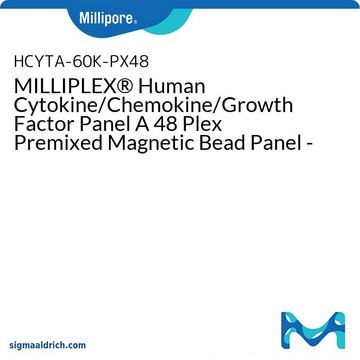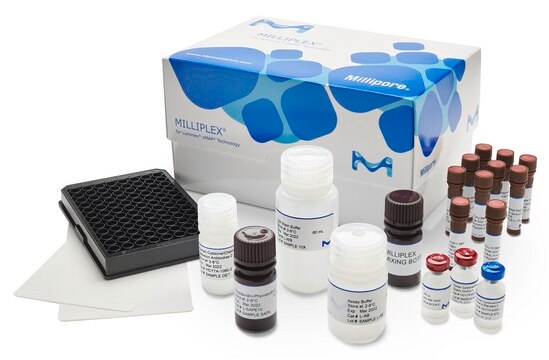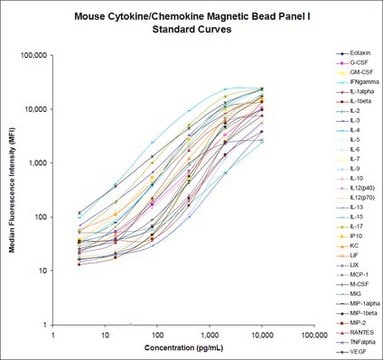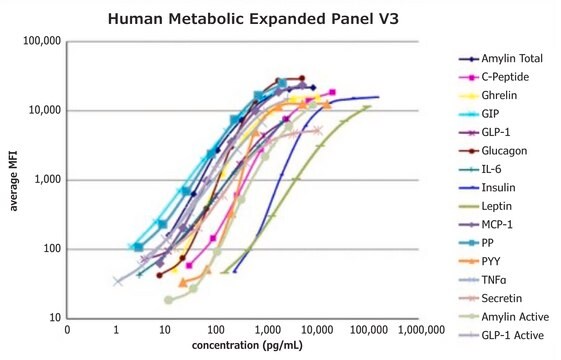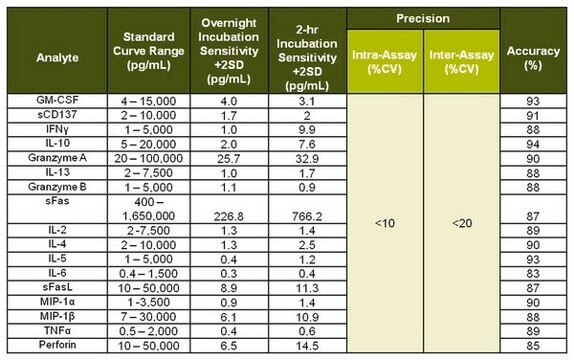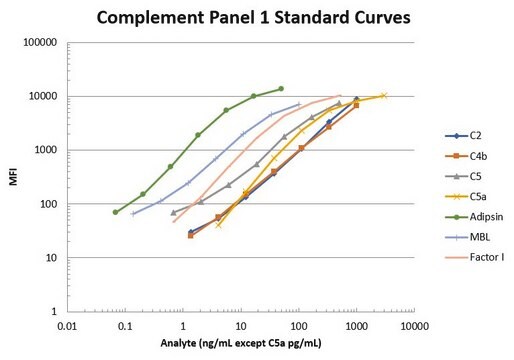HSTCMAG-28SK
MILLIPLEX® Human High Sensitivity T Cell Panel - Immunology Multiplex Assay
Simultaneous analyze low levels of cytokine and chemokine biomarker with the High Sensitivity Bead-Based Multiplex Assays using the Luminex technology, in human serum, plasma and cell culture samples.
Synonym(s):
Human high-sensitivity cytokine multiplex kit, Luminex® human high-sensitivity cytokine immunoassay, Millipore human high-sensitivity cytokine panel
About This Item
Recommended Products
Quality Level
species reactivity
human
manufacturer/tradename
Milliplex®
assay range
accuracy: 98-107%
sensitivity: 0.11-8.17 pg/mL
(Overnight Incubation minDC)
standard curve range: 0.18-750 pg/mL
(IL-6)
standard curve range: 0.24-1,000 pg/mL
(IL-13)
standard curve range: 0.24-1,000 pg/mL
(IL-21)
standard curve range: 0.31-1,250 pg/mL
(IL-8)
standard curve range: 0.31-1,250 pg/mL
(MIP-1α)
standard curve range: 0.37-1,500 pg/mL
(IL-7)
standard curve range: 0.45-1,750 pg/mL
(TNFα)
standard curve range: 0.49-2,000 pg/mL
(IL-1β)
standard curve range: 0.49-2,000 pg/mL
(IL-12 (p70))
standard curve range: 0.49-2,000 pg/mL
(IL-2)
standard curve range: 0.49-2,000 pg/mL
(IL-5)
standard curve range: 0.61-2,500 pg/mL
(IFNγ)
standard curve range: 0.61-2,500 pg/mL
(MIP-3α)
standard curve range: 0.73-3,000 pg/mL
(IL-17A)
standard curve range: 0.92-3,750 pg/mL
(MIP-1β)
standard curve range: 1.22-5,000 pg/mL
(GM-CSF)
standard curve range: 1.46-6,000 pg/mL
(IL-10)
standard curve range: 1.46-6,000 pg/mL
(ITAC)
standard curve range: 1.83-7,500 pg/mL
(IL-4)
standard curve range: 18.3-75,000 pg/mL
(Fractalkine)
standard curve range: 7.93-32,500 pg/mL
(IL-23)
inter-assay cv: <15%
intra-assay cv: <10%
technique(s)
multiplexing: suitable
detection method
fluorometric (Luminex xMAP)
shipped in
wet ice
General description
The MILLIPLEX® Human High Sensitivity T Cell Magnetic Bead Panel is to be used for the simultaneous quantification of any or all of the following analytes in human plasma, serum, and cell/tissue culture supernatant samples: Fractalkine, GM-CSF, IFNγ, IL-1β, IL-2, IL-4, IL-5, IL-6, IL-7, IL-8, IL-10, IL-12 (p70), IL-13, IL-17A, IL-21, IL-23, ITAC, MIP-1α, MIP-1β, MIP-3α
and TNFα.
The Luminex® xMAP® platform uses a magnetic bead immunoassay format for ideal speed and sensitivity to quantitate multiple analytes simultaneously, dramatically improving productivity while conserving valuable sample volume.
Panel Type: Cytokines/Chemokines
Specificity
There is no detectable cross-reactivity within the panel.
Application
- Analytes: Fractalkine, GM-CSF, IFNγ, IL-1β, IL-2, IL-4, IL-5, IL-6, IL-7, IL-8, IL-10, IL-12 (p70), IL-13, IL-17A, IL-21, IL-23, I-TAC, MIP-1α, MIP-1β, MIP-3α, TNF-α
- Because there are unique features concerning sample prep and assay set-up, please read the entire protocol before running the assay.
- Recommended Sample type: Serum, plasma or tissue/cell lysate and culture supernatant
- Assay Run Time: Overnight
- Research Category: Inflammation & Immunology
- Research Subcategory: Immune Response, Metabolic Disorders, Chronic Inflammatory Disease, Cardiovascular Disease, Neuroscience
Features and Benefits
Linkage
Storage and Stability
Other Notes
Legal Information
Disclaimer
recommended
Signal Word
Danger
Hazard Statements
Precautionary Statements
Hazard Classifications
Acute Tox. 4 Dermal - Acute Tox. 4 Inhalation - Acute Tox. 4 Oral - Aquatic Chronic 2 - Eye Dam. 1 - Skin Sens. 1 - STOT RE 2
Target Organs
Respiratory Tract
Storage Class Code
10 - Combustible liquids
Certificates of Analysis (COA)
Search for Certificates of Analysis (COA) by entering the products Lot/Batch Number. Lot and Batch Numbers can be found on a product’s label following the words ‘Lot’ or ‘Batch’.
Already Own This Product?
Find documentation for the products that you have recently purchased in the Document Library.
Related Content
Immunology multiplex assays, like MILLIPLEX® assays, allow researchers to investigate more immune biomarkers simultaneously, saving time and resources. This is especially critical to immunology research, where numerous analytes play a role in different pathways.
Our team of scientists has experience in all areas of research including Life Science, Material Science, Chemical Synthesis, Chromatography, Analytical and many others.
Contact Technical Service
